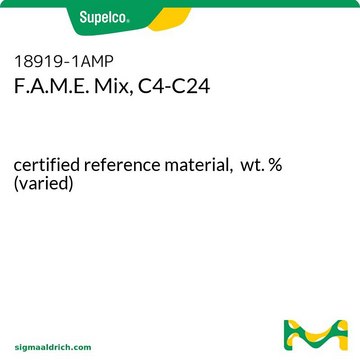1.04717
Isooctane
for liquid chromatography LiChrosolv®
Synonym(s):
2,2,4-Trimethylpentane, 2,2,4-Trimethylpentane, Isobutyltrimethylmethane, iso-Octane, Isooctane
About This Item
Recommended Products
vapor density
3.9 (vs air)
Quality Level
vapor pressure
41 mmHg ( 21 °C)
product line
LiChrosolv®
grade
isocratic
Assay
≥99% (GC)
form
liquid
autoignition temp.
745 °F
potency
>2500 mg/kg LD50, oral (Rat)
expl. lim.
6 %
technique(s)
HPLC: suitable
impurities
≤0.0002 meq/g Acidity
≤0.0002 meq/g Alkalinity
≤0.01% Water
evapn. residue
≤2.0 mg/L
transmittance
210 nm, ≥50%
220 nm, ≥80%
245 nm, ≥98%
refractive index
n20/D 1.391 (lit.)
pH
7
bp
98-99 °C (lit.)
mp
−107 °C (lit.)
transition temp
flash point -12 °C
density
0.692 g/mL at 25 °C (lit.)
storage temp.
2-30°C
SMILES string
CC(C)CC(C)(C)C
InChI
1S/C8H18/c1-7(2)6-8(3,4)5/h7H,6H2,1-5H3
InChI key
NHTMVDHEPJAVLT-UHFFFAOYSA-N
Looking for similar products? Visit Product Comparison Guide
General description
Application
- Spectral Investigations of Fluorescence Tracers in Automotive and Aviation Fuels under Cryogenic Conditions: This research highlights the use of isooctane in studying the behavior of fuels at low temperatures, proving essential for improving fuel performance and safety in automotive and aviation industries (Koegl et al., 2024).
- Versatile Application of TiO2@PDA Modified Filter Paper for Oily Wastewater Treatment: Demonstrates isooctane′s role in assessing the efficiency of innovative materials designed for environmental applications, specifically in the treatment of oily wastewaters, enhancing sustainability in industrial practices (Zhao et al., 2023).
- Characterization and Pilot-Scale Application of the ZMS-2 Serine Protease with Novel Properties for the Eco-friendly Leather Processing: Utilizes isooctane in extracting and characterizing enzymes that significantly reduce the environmental impact of leather processing, marking a step forward in sustainable industrial manufacturing (Khan et al., 2023).
- Rapid Construction of Caffeic Acid/p-Phenylenediamine Antifouling Hydrophilic Coating on a PVDF Membrane for Emulsion Separation: Investigates the role of isooctane in creating advanced coating solutions that improve the efficiency and longevity of separation processes, critical for environmental engineering (Tong et al., 2023).
Specifications
Preparation Note
Analysis Note
Identity (IR): conforms
Evaporation residue: ≤ 2.0 mg/l
Water: ≤ 0.01 %
Acidity: ≤ 0.0002 meq/g
Alkalinity: ≤ 0.0002 meq/g
Transmission (at 210 nm): ≥ 50 %
Transmission (at 220 nm): ≥ 80 %
Transmission (from 245 nm): ≥ 98 %
Filtered by 0.2 µm filter
Other Notes
Legal Information
Signal Word
Danger
Hazard Statements
Precautionary Statements
Hazard Classifications
Aquatic Acute 1 - Aquatic Chronic 1 - Asp. Tox. 1 - Flam. Liq. 2 - Skin Irrit. 2 - STOT SE 3
Target Organs
Central nervous system
Storage Class Code
3 - Flammable liquids
WGK
WGK 2
Flash Point(F)
10.4 °F - closed cup
Flash Point(C)
-12 °C - closed cup
Certificates of Analysis (COA)
Search for Certificates of Analysis (COA) by entering the products Lot/Batch Number. Lot and Batch Numbers can be found on a product’s label following the words ‘Lot’ or ‘Batch’.
Already Own This Product?
Find documentation for the products that you have recently purchased in the Document Library.
Customers Also Viewed
Our team of scientists has experience in all areas of research including Life Science, Material Science, Chemical Synthesis, Chromatography, Analytical and many others.
Contact Technical Service










